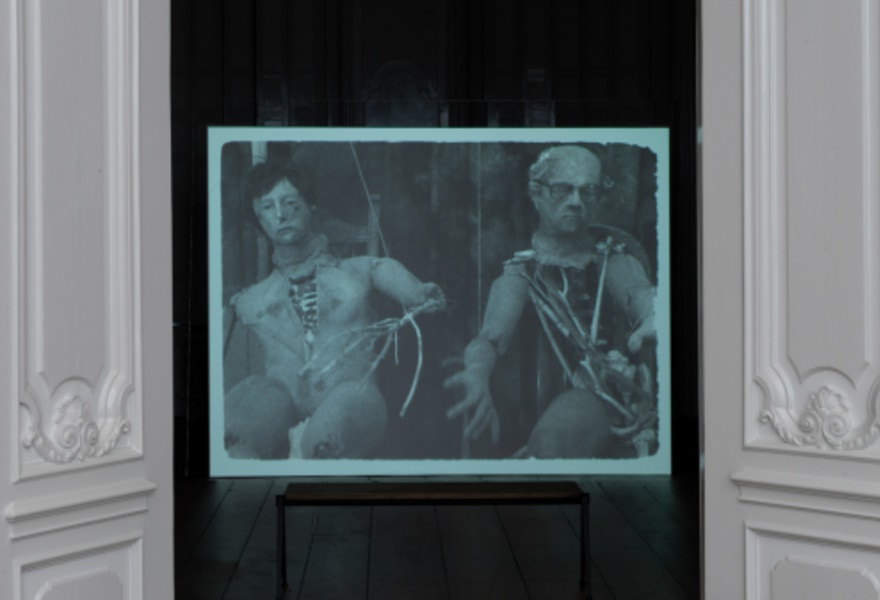25 march 2022, Flor Linckens
An imaginative reflection on a dark history
In the 'Burials' exhibition at Upstream Gallery, we see how the Chilean artist duo León en Cociña uses fantasy to rewrite a dark chapter from the past.
Between 11 September 1973 and 11 March 1990, the political history of Chile was marked by the military dictatorship of General Augusto Pinochet, who came to power after a (US-backed) coup d'état. The regime resulted in the systematic oppression of dissenters and a widespread violation of human rights, resulting in the death and disappearance of thousands of people. Over 200,000 Chileans chose to leave the country during this time.
Chilean artists Cristóbal León and Joaquín Cociña were both born in Chile in 1980, the year in which the current constitution was signed by Pinochet and his government. Their latest film "Los Huesos" ("The Bones") was first conceived in 2019, at a time when several demonstrations took place in Chile. These were brutally crushed by the government, resulting in hundreds of victims and injured. However, the demonstrations did spark a political process. As we speak, a new constitution is being written within a democratic context. This new constitution will be voted on in the third quarter of this year. That means that for the first time since 1833, the constitution will be written by a democratically elected citizens' convention.
As artists, how do you reflect on a history that is repeatedly marked by violence? León and Cociña use their imagination to partially rewrite history. Their film "Los Huesos" is presented as a restoration of the original, supposedly lost, Chilean animation film from 1901. The badly damaged tapes are found during a (fictional) excavation, which suddenly turns Chile into the birthplace of animation film, in favour of Europe and North America. In a series of black and white images on 16 millimeter film, we see a young girl who evokes the ghosts of two historical politicians, with the help of bones and magical or religious rituals. Conservative politician Diego Portales was involved in shaping the first constitution in 1833, fifteen years after the independence from Spain. He is accompanied by Jaime Guzmán, who helped Pinochet draft the second constitution of 1980. Once summoned, the girl forces them to undo the history for which they are partly responsible. The film "Los Huesos" premiered at the Venice Film Festival in 2021, where it received the award for best short film. The film is now having its Dutch premiere in Upstream Gallery. It was produced by Ari Aster, the director of famous films such as Midsommar and Hereditary.
The artist duo has been collaborating since 2007. In their practice, Cociña's background in drawing merges seamlessly with León's background in animation. Both artists studied at the Universidad Católica in Santiago de Chile and León also studied at the UDK in Berlin and De Ateliers in Amsterdam. They apply a combination of techniques for their practice: from photography, drawing, sculpting and painting to performance. The artists are inspired by a variety of sources, including Latin American culture and mysticism, but also by other filmmakers such as David Lynch and, in terms of self-imposed rules, the filmmakers from the dogma movement.
León and Cociña's work is marked by a seemingly unpolished visual language and stop-motion, in which the light-heartedness of the fairytale-like characters in papier-mâché contrasts sharply with the themes that the artists explore — including death, traumatic historical events, religion, power and sex. For example, 2018's "La Casa Lobo" ("The Wolf's House") centers on the true story of Colonia Dignidad, a German colony in Chile that was founded in 1961 by the Nazi pastor Paul Schäfer, who fled Germany after the war. The religious commune had a strong dystopian character and functioned as a prison, in which the inhabitants had to perform forced labour. When Pinochet came into power, the enclave was used for arms production, money laundering, torture and pedophilia. Only five people ever managed to escape. The filmmakers start "La Casa Lobo" as a propaganda film for the commune, in which all 'rumours' are denied. However, through the main character Maria, we get to see what is really going on. Although the chosen subjects are generally heavy, the execution is often (tragi)comic and absurd.
The artist duo occasionally works in a nomadic way. For instance, some films were not made in a studio, but rather in the many spaces in which the unfinished project was exhibited. Many of the materials used — from tape and found objects to charcoal — originate from those exhibition spaces, combined with material from flea markets and such.
In addition to "Los Huesos", the Upstream Gallery exhibition also features a series of paintings from their latest ongoing project "Los Angeles", a futuristic adventure film that is yet to be made — accompanied by sculptures and audiovisual works, among other things — for which the artists have created a series of painted 'movie posters'. Supposedly, this film was produced in Chile of the 1940s or 1950s and it stars Miguel Serrano, a historical Nazi sympathizer, diplomat and writer. By starting with the painted 'posters', the artists want to focus on the last, concluding phase of the film production process, while presenting the images as autonomous works of art.
The enigmatic work of León and Cociña has previously been shown in the Latin American Pavilion at the 2013 Venice Biennale, as the Guggenheim in New York, KW Berlin and Whitechapel Gallery in London. Their first feature film "La Casa Lobo" was awarded the Caligari Film Prize in 2018 at the 68th Berlinale.



